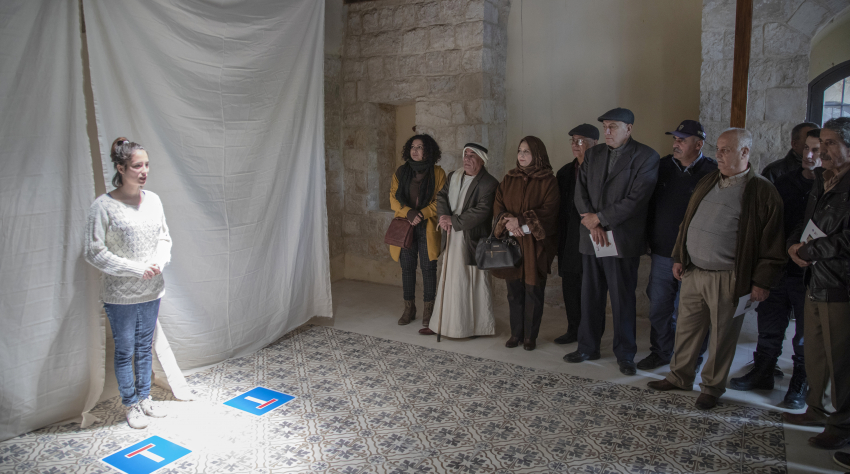
Anabta – Tulkarem (A. M. Qattan Foundation – 5 January 2019):
On Thursday, 3 January 2019, the Educational Research and Development Programme (ERDP) of the A. M. Qattan Foundation (AMQF) launched Faces for Masks: An Experimental Exhibition. The event was organised in collaboration with the Swiss Agency for Development and Cooperation (SDC) and Women Development House in Anabta, Tulkarem.
Having lasted until Sunday, 6 January 2019, the exhibition featured a collection of art projects. These were developed by participants in a series of workshops, which the ERDP organised last year. Targeting young men and women in the town of Anabta and surrounding communities, training workshops were held in the context of the Culture, Art and Social Engagement project, which aims at promoting social responsibility and engagement though culture and arts.
Malik Al-Remawi, Manager of the ERDP Languages and Humanities Track and Manager of the Culture, Art and Social Engagement project, explained that the title of the exhibition, Faces for Masks, reflects the essence of the project. It is the quest for our real faces as individuals so that we can divulge and discover them through various forms of arts. Most often, we are forced to live behind masks, which are imposed on us from the outside.
“The second part of the title, Experimental Exhibition, reflects the fact that the exhibition was not the end product in itself. It builds on the project experience and exhibits its products.” Al-Remawi added.
The exhibition comprised two sections. Titled Full Moon (14th Night of the Moon), the first section featured art works produced by women, who participated in encounters on community issues with Trainer Petra Barghouthi. In their works, participants used art tools to investigate and attempt to deconstruct and recompose women’s ego. Participants expressed themselves by means of three forms of art: sculpture, video art, and performing arts. Products were exhibited in three separate, but adjacent, rooms.
Khadijah Da’as, a 40-year-old participant in the exhibition, indicated that her art work (a sculpture) might have not been worked out perfectly. However, she believed that the experience has empowered her to express her feelings and understand herself and her surrounding environment. Starting with encounters on therapeutic arts, drama and writing, this experience ended with producing an art work that was exhibited to visitors.
Titled Hold the Camera, the second section involved a photography exhibition. It was produced by a group of 20 young women, who engaged in training events with Photographer Bilal al-Khatib. In addition to photography techniques, the training focused on how to take photos of, and express issues, through the camera. In their works, young women discussed a number of issues. They addressed personal concerns, including restrictions imposed on each girl in the village community. Young women also reflected public concerns, including environmental pollution and negligence of heritage houses. Additionally, this part of the exhibition featured a documentary film, titled This is My Face … This is Me. In this film, girls talk to the camera about their experience in photography.
Masah al-Balbisi, 19 years old said she was proud that her photos were exhibited to the public audience for the first time. She said that the project has changed her view of photography. Now, she thinks more of the message of every photo. She also applies all the technical aspects she has learned.
The exhibition and preparatory training events were curated and supervised by Al-Remawi together with Artists Petra Barghouthi and Bilal al-Khatib, Abd Al Kareem Hussein, ERDP Researcher and Coordinator, Samah Khawaja, ERDP Assistant Coordinator, Jihad Sabboubah, Director of the Women Development House, and Randa Abu Saa’, Activity Coordinator at the Women Development House, Anabta.
The AMQF launched the Culture, Art and Social Engagement project three years ago. Through this project, the Foundation has carried out activities in six local communities, including Anabta. The project aspires for highlighting the role culture and arts can play as effective tools in promoting development, encouraging community participation, and strengthening social cohesion and cultural identity. It ultimately seeks to consolidate freedom of expression and community accountability.
The exhibition was inaugurated in the presence of Abdul Fattah Nour, Mayor of Anabta, representatives of the directorate offices of the Ministry of Culture, Ministry of Social Development and Ministry of Education, Jihad Sabboubah, Director of the Women Development House, Fida Touma, AMQF Director General, and Wasim Al-Kurdi, ERDP Director.
